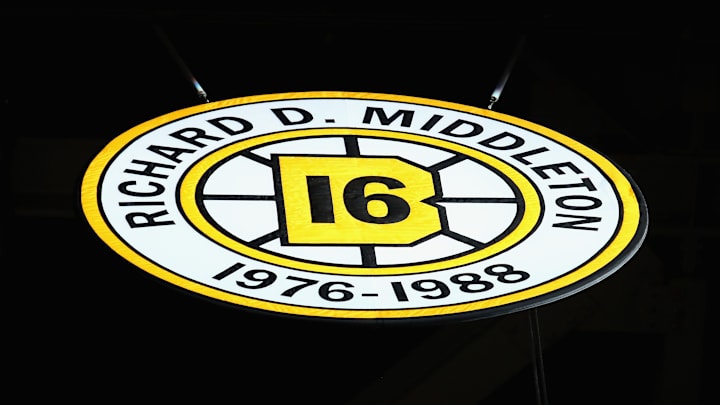Number 30: Cheevers & Thomas
Gerry Cheevers did not have the instantaneous success of Thompson & Brimsek, as he was drafted to the Bruins in 1965, right in the thick of the worst era in franchise history. Just a few years later, though, Cheevers would hit his stride and become one of the most popular and successful goaltenders in Bruins history. Along with being the man to begin the tradition of customizing goalie masks, he helped the Bruins bring home two Stanley Cups (1970, 1972), holds multiple franchise records and holds the NHL record for longest undefeated streak (32 games), that no goaltender has come close to breaking since 1983 (Pete Peeters - 31 games)
After the 1972 Stanley Cup season, Cheevers left the NHL for the newly formed WHA. He played on the Cleveland Crusaders for three and a half seasons before a financial dispute with general manager Jack Vivian led him to retire from the WHA and return to the NHL, re-signing with the Bruins for his second stint with the franchise in 1976. Cheevers retired from his playing career after the 1980 season to become head coach of the Bruins. Over his two stints with Boston, spanning 12 seasons, Cheevers finished his Bruins career with a 226-103-76 record, a .901 SV%, and a 2.89 GAA.
Cheevers holds the franchise record for most playoff seasons (10) with a 53-34 record over that time, a .902 SV%, and a 2.70 GAA with a franchise record of 8 shutouts. Cheevers also holds the franchise record for longest playoff win streak (10 games), and was selected to the 1969 NHL All-Star game. Cheevers was inducted into the Hockey Hall of Fame in 1985.
It took Tim Thomas even more time than the aforementioned goalies to settle into the NHL. Thomas was drafted by the Quebec Nordiques in 1994, finished his time at the University of Vermont, then spent time in the ECHL, the IHL twice, Finland three times, the AHL, and Sweden, before signing with the Bruins in August 2002. Thomas started four games in the 2002-2003 season, spending the rest of his time in Providence before the 2004-2005 NHL lockout season when he went back to Finland for the fourth time. Once the lockout ended the next season, he returned to Providence and before long, he was back in Boston.
Thomas spent the next couple of seasons proving himself as the starting goaltender in Boston, leading to a full revival of the Bruins organization. In 2009, Thomas won his first Vezina Trophy and took home the Jennings Trophy alongside his partner Manny Fernandez, after lighting up the league with a 36-11-7 record, a .933 SV%, and a 2.10 GAA with five shutouts. The 2010-2011 season was Thomas’s career year. He went 35-11-9 with a .938 SV% and a 2.00 GAA with nine shutouts. His .938 SV% is tied for the Bruins record of highest save percentage in a season.
Thomas won his second Vezina this season and led the Bruins to their first Stanley Cup victory since 1972, when he had one of the single greatest postseasons in Bruins history, defeating the Vancouver Canucks in seven games. Thomas went 16-9 with a .940 SV% and a 1.98 GAA with four shutouts in the playoffs, earning him the Conn Smythe Trophy, and becoming the first American born-goaltender to win the award.
Thomas holds multiple NHL records from his historic postseason performance, including most saves in a playoff year (798), most saves in a Stanley Cup Final series (238), and most game 7 wins in a playoff year (3). He also holds the Bruins franchise record for most shutouts in a playoff year (4), and most wins in a playoff year (16).
Thomas had another great regular season in 2011-2012, going 35-19-1 with a .920 SV% and a 2.36 GAA with five shutouts. In the summer of 2012, Thomas announced on his Facebook page that he would be sitting out the 2012-13 season to focus on his personal life, which led him to be traded to the New York Islanders on February 7, 2013. Thomas was a four-time All-Star and currently holds the NHL record for highest playoff career save percentage (.933%). He was inducted into the US Hockey Hall of Fame in 2019.
